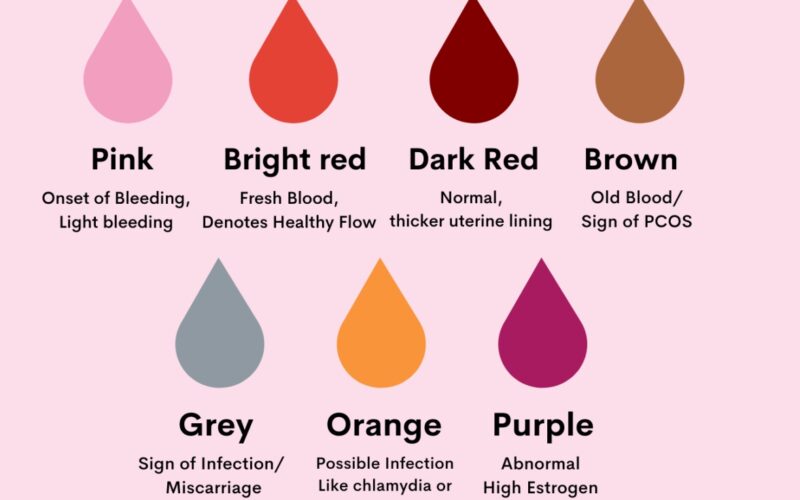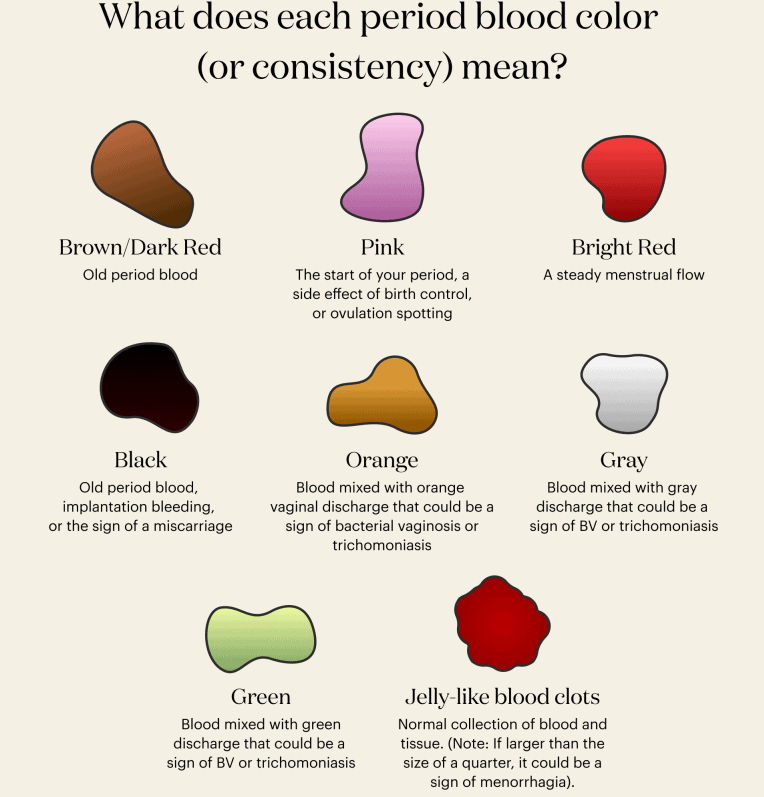Why is my period blood brown

Period blood can appear brown in color due to the presence of older blood. Blood turns brown as it becomes oxygen-deprived and takes on a rusty or brownish hue. This is also why the blood is sometimes thicker and has a stronger odor. It is completely normal for period blood to have different colors and consistencies throughout the menstrual cycle.
What to do my period blood is brown
If a woman’s period blood is consistently brown, it is generally not a cause for concern. However, if the brown color is accompanied by other symptoms such as heavy bleeding, severe cramps, or a foul smell, it is important to consult with a healthcare provider. They may recommend further testing or treatment, such as a pelvic exam or ultrasound, to rule out any underlying conditions.
If you are experiencing heavy bleeding or cramping and it affects your daily life, it’s best to seek medical help. Your healthcare provider can help you determine the cause and recommend the appropriate treatment.
Remember to maintain good personal hygiene during menstruation to avoid infection, using sanitary products such as pads or tampons can help with this.
Does brown blood mean pregnancy?
It is not typically an indication of pregnancy. However, it is possible for a woman to experience light spotting or discharge early in her pregnancy, which may be mistaken for a light period.
If you suspect that you may be pregnant and you notice brown blood, it’s important to confirm your pregnancy with a pregnancy test and consult with your doctor or a gynecologist. A gynecologist can perform a pelvic exam and any necessary tests to confirm the pregnancy, and check for any issues or complications.

Why am I getting brown discharge instead of my period?
Brown discharge instead of a period can be caused by a numerous factors. Some possible causes include:
- Hormonal imbalances: Hormonal imbalances can cause changes in the menstrual cycle, which can lead to brown discharge instead of a period.
- Birth control: Certain types of birth control, such as the hormonal IUD or birth control pills, can cause changes in the menstrual cycle, leading to brown discharge instead of a period.
- Polyps or fibroids: Non-cancerous growths in the uterus, such as polyps or fibroids, can cause brown discharge instead of a period.
- Infections: Certain types of infections, such as a yeast or bacterial infection, can cause brown discharge instead of a period.
- Perimenopause or menopause: As a woman approaches menopause, hormonal changes can cause brown discharge instead of a period.
How long does brown period blood last?
The duration of brown period blood can vary depending on the individual and the underlying cause. In most cases, brown period blood is the result of older blood being released and is usually at the beginning or end of the menstrual cycle. Brown period blood is usually considered as a light flow, so it may last shorter than a regular period.
If the brown period blood is caused by hormonal imbalances or other conditions, the duration may be longer. It is best to consult with a gynecologist if you notice that the brown period blood is lasting longer than usual or if it is accompanied by other symptoms such as heavy bleeding, severe cramps, or a foul smell.
Keep track of your menstrual cycle, any changes in color and consistency, as well as any other symptoms that you experience. This information can be helpful for your gynecologist when assessing your condition.
Can stress cause brown discharge?
Stress can affect the body in many ways, and it is possible that it could play a role in causing brown discharge. Stress can cause hormonal imbalances, which can lead to changes in the menstrual cycle and cause brown discharge instead of a period or as a light spotting.
However, it is important to note that brown discharge caused by stress is usually a symptom of hormonal imbalances or other underlying conditions such as Polyps or fibroids, infections, perimenopause or menopause.
Brown discharge can be caused by other factors, such as certain types of birth control, certain types of infections, or non-cancerous growths in the uterus. If you are experiencing brown discharge and have been under a lot of stress lately, it’s best to consult with a gynecologist . They can perform an examination and any necessary tests to determine the cause and recommend the appropriate treatment.
Try to manage stress in a healthy way, such as through regular exercise, good sleep habits, and other stress-management techniques.
Do you count brown blood as first day of period?
It depends on the individual and the context. In general, when counting the first day of a period, it is considered the first day of menstrual bleeding. This means that if you are experiencing brown blood that is considered light spotting or discharge, it would not be considered the first day of your period.
However, if the brown blood is heavy and has the same characteristics as menstrual bleeding, it can be considered as the first day of the period. Menstrual cycles can vary from person to person, and some women may experience brown blood at the beginning of their period, which is called implantation bleeding and it happens when the fertilized egg attaches to the lining of the uterus.
Is brown period blood healthy?
In most cases, brown period blood is not a cause for concern and is considered a normal variation of menstrual bleeding. Brown blood is often the result of older blood being released, and it can occur at the beginning or end of a menstrual cycle. It is completely normal for menstrual blood to have different colors and consistencies throughout the cycle.
However, if the brown color is accompanied by other symptoms such as heavy bleeding, severe cramps, or a foul smell, it is important to consult with a healthcare provider. They may recommend further testing or treatment, such as a pelvic exam or ultrasound, to rule out any underlying conditions.
Best final advice
It is important for a women to take an active role in their health and to be aware of any changes in their menstrual cycle. Keeping track of your menstrual cycle, any changes in color and consistency, as well as any other symptoms that you experience, can provide valuable information for your healthcare provider when assessing your condition.
If you have any concerns or if you are experiencing heavy bleeding that affects your daily life or causes anemia, it’s best to seek medical help.
Do your best to maintain good personal hygiene during menstruation to avoid infection, using sanitary products such as pads or tampons can help with this. And if you are experiencing brown period blood and you suspect it may be caused by stress, it’s also important to manage stress in a healthy way, such as through regular exercise, good sleep habits, and other stress-management techniques.
By following this advice, a women can be proactive in taking care of their health and ensuring that any concerns are addressed in a timely manner.









